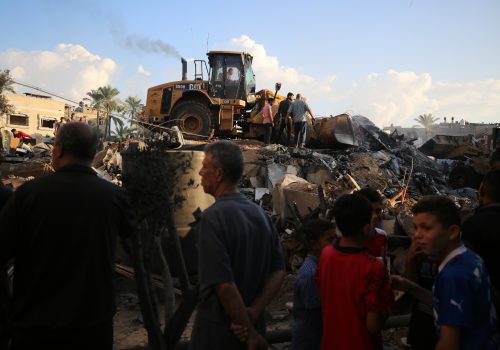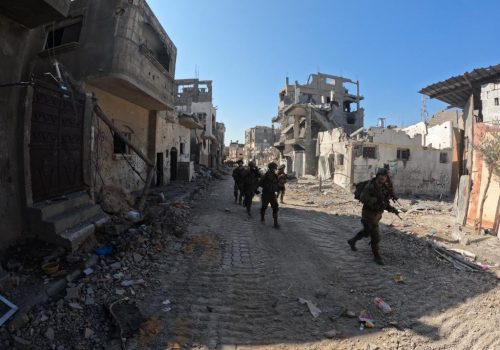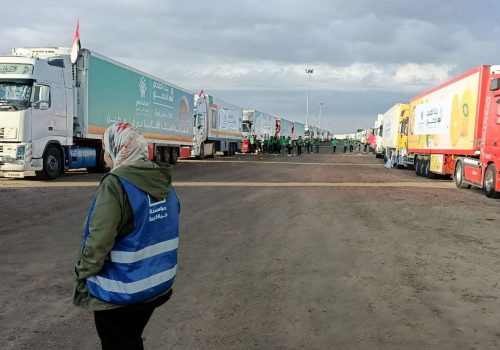Hamas hostage-taking must not go unpunished. The ICC must make a case against the terrorist group.
Hamas hostage-taking is a standing threat to global security. If this crime is left unaddressed and its victims go without redress, international norms will be severely eroded, and the world risks witnessing a rise in hostage-taking and terrorist atrocities.
Hamas’ atrocities on October 7, 2023 featured the largest international hostage-taking in modern history. Inhumane acts—including public beheadings, desecration of corpses, rape, and mutilation—were perpetrated and recorded on video for broadcast during the assault. Over 240 people were taken captive, representing over twenty-five different nationalities, many different ethnicities, and a range of religions and beliefs. They span all ages and vulnerabilities, including a baby, a cancer patient, and a wheelchair-bound Holocaust survivor. While motivated by genocidal antisemitism, Hamas’ crimes envelop all of humanity.
This unprecedented hostage-taking was the culmination of a long and violent history of international crimes by Hamas. The organization’s reign of terror and kidnapping intensified following its 2007 violent takeover of the Gaza Strip from the Palestinian Authority, which was accompanied by the execution of political opponents, scores of attacks against Christians for exercising their right to freedom of religion, and the torture and arbitrary detention of rivals, journalists, and peace activists. Hamas’ crimes against Palestinians have continued unabated in its two decades of domination over the Gaza Strip, whose population Hamas effectively holds hostage.
Over the course of years of Hamas terror attacks against Israeli civilians, hostage-taking has emerged as a prevailing theme:
- In 2006, Israeli soldier Gilad Shalit was illegally taken captive and held under conditions violating international law without news of his whereabouts, health, or any sign of life. He was used as a bargaining chip and was released five years later in exchange for over one thousand convicted terrorists, many of whom went on to commit further crimes, including masterminding the October 7, 2023 massacres.
- In 2014, Hamas kidnapped and murdered three teenage Israeli students.
- In the same year, Hamas violated a US-brokered and United Nations-mandated ceasefire by taking two soldiers hostage: Hadar Goldin and Oron Shaul. They were believed to have been killed, with their remains continuing to be withheld illegally.
- Two civilians, Avera Mengistu and Hisham al-Sayed, who unwittingly entered Gaza due to mental illness, have been illegally held hostage by Hamas since 2014 and 2015, respectively.
Hamas’ continued holding of hostages and many abuses of them—withholding of information on identity and situation; inhumane and degrading treatment, including forced participation in propaganda materials and being publicly paraded through Gaza; sexual and gender-based violence; torture and denial of medical treatment; use of hostages as human shields; murder of those held; and holding and desecrating remains—are crimes against humanity and a standing violation of international law.
These acts are prohibited under customary international law and in treaties, including the Convention Against Torture, the Convention Against Hostage-Taking, and the Geneva Conventions. The Convention on the Rights of the Child and Convention on the Rights of Persons with Disabilities further underscore the unique vulnerabilities and protections for specific victim classes held by Hamas. Whether considered an international armed conflict or non-international armed conflict, there are clear legal prohibitions against taking hostages, torturing hostages, executing hostages, and outrages upon personal dignity, including humiliating and degrading treatment. Withholding remains, preventing their repatriation and burial, and desecrating or mutilating remains are prohibited as outrages upon personal dignity.
These criminal acts are in breach of Islamic principles and prohibitions, including in the Cairo Declaration on Human Rights in Islam, which states that “[t]aking hostages under any form or for any purpose is expressly forbidden” and that the dignity of the dead must be protected from desecration. As Karim Khan, the chief prosecutor of the International Criminal Court (ICC) put it, “[c]hildren and men and women and elderly people cannot be ripped from their homes and taken as hostages…They are the most un-Islamic of acts and cannot be committed in the name of a religion whose very meaning is peace. These acts represent some of the most serious violations of international humanitarian law.”
Under the Rome Statute of the International Criminal Court, Hamas committed war crimes and crimes against humanity under Article 7(1)(c),(e),(f),(g) (i), and (k); Article 8(c)(i), (ii), and (iii); Article 8(e)(i), (vi), and (xi). In particular, Article 7(2) defines “enforced disappearance of persons” as the “abduction of persons by, or with the authorization, support or acquiescence of, a State or a political organization, followed by a refusal to acknowledge that deprivation of freedom or to give information on the fate or whereabouts of those persons, with the intention of removing them from the protection of the law for a prolonged period of time.” As per Article 7(1), when carried out as part of a widespread or systematic attack directed against a civilian population, enforced disappearance is a crime against humanity. Hamas’ hostage-taking of over 240 people and withholding of information on abductees—as part of widespread and systematic attacks on the Israeli civilian population—clearly meet these criteria.
Despite obstacles—Israel is not a member of the ICC; leading international law scholars and subject experts assert that the court does not have jurisdiction over Israel; and a diverse group of key Rome Statute states filed briefs at the court arguing that there is no jurisdiction over Israel—recent developments provide a path forward for Hamas victims. Following Palestinian ratification of the Rome Statute and a controversial request from then-Prosecutor Fatou Bensouda, the Pre-Trial Chamber determined that “Palestine is a state party to the Statute” strictly for the first stage of proceedings, without bearing on questions of sovereignty or borders, and with disagreement amongst the judges on territorial jurisdiction.
This means there is jurisdiction for issuing arrest warrants based on personal jurisdiction for crimes committed by Palestinian nationals. The current prosecutor Karim Khan affirmed this position in a recent public statement, with specific reference to investigating and punishing the crime of hostage-taking. He reiterated this position following a solidarity visit hosted by the families of Israeli hostages, the first-ever visit by an ICC Prosecutor to the region.
Sign up for the This week in the Mideast newsletter
As Hamas victims provide crucial evidence and testimony, including Palestinians and Israelis taken hostage and brutalized by the terror group, the court should be encouraged to prioritize the investigation of Hamas perpetrators and move expeditiously toward the issuance of arrest warrants against them.
Rule-of-law nations, while seized of the crimes against their nationals taken hostage in Israel, concerned for the impunity that underpins it, and highly supportive of issuing arrest warrants against Hamas, may be reluctant to appear to interfere with the independence of the Office of the Prosecutor at the investigative phase and therefore might not intervene.
However, demonstrating the broad global consensus on the need for accountability for Hamas crimes—including the worst international terrorist kidnapping in modern history—and reinforcing norms against hostage-taking would serve the ICC and support the prosecutor’s mandate. It would also help deter rising global terrorism and the crimes of its pariah state supporters.
As a proxy of the Resistance Axis that is armed and trained by Iran, uses North Korean weapons, and receives diplomatic support from Russia, Hamas commits crimes on behalf of the most malign and regionally destabilizing actors. These rights-abusing regimes trade best practices on bad conduct and use each other’s crimes as a testing ground for their own. Russia deploys Iranian drones and North Korean weapons in its atrocities against Ukrainians, just as Hamas does with Israelis. South Korea and Japan face the threat of a Hamas-like invasion from North Korea, with the prospect of tunnels across the demilitarized zone, kidnappings, and missiles targeting civilians, with lessons drawn from Hamas crimes and the impunity surrounding them.
The states with the greatest stake in upholding the rules-based international order are also those facing the greatest threats from the rogue regimes that back Hamas.
Many of the most concerned countries were founding members and top funders of the International Criminal Court and intervened under the Rome Statute in historic numbers to support the investigation of crimes against Ukraine via state referrals, grants, and secondments. The same approach should be taken regarding Hamas crimes.
While unprecedented public state support pursuant to the Rome Statute helped bring about the expeditious issuance of warrants against Russian President Vladimir Putin and Presidential Commissioner for Child Rights, Maria Lvova-Bevova, for the forced deportation of Ukrainian children, these warrants, in turn, brought greater credibility and contributions to the ICC, most notably from the United States as a non-member of the court. Above all, it comforted suffering victims and gave them hopes of seeing justice.
Likewise, countries intervening under the Rome Statute for arrest warrants against Hamas leaders for the parallel kidnapping of Israeli children will expedite the process. Similarly, their issuance will, in turn, generate more state support for the crucial mission and mandate of the ICC while supporting victims in their greatest hour of need.
As securing the return of the hostages and justice for the perpetrators are a major national priority and preoccupation in Israel and the United States, warrants and eventual prosecutions could also significantly advance a new golden era of cooperation for the court and expand ratification of the Rome Statute.
The world’s worst terrorist crimes and the plight and pain of its victims demand urgent action. Justice delayed is justice denied, especially for those being tortured in Hamas captivity and their loved ones being tormented in awaiting their return. The ICC and all those supporting the cause of justice should prioritize the case against Hamas in 2024.
Brandon Silver is an international human rights lawyer and director of policy and projects at the Raoul Wallenberg Centre for Human Rights, and pro bono international counsel to the Families of Hamas Hostages and Missing Persons.
Irwin Cotler is a former minister of justice and attorney general of Canada and long-time parliamentarian. He is professor emeritus of international law at McGill University and chair of The Raoul Wallenberg Centre for Human Rights.
Further reading
Mon, Oct 16, 2023
Hamas’s actions are war crimes. Israel should not respond with further war crimes.
MENASource By Elise Baker
There are clear indications that both Hamas and the IDF have violated international humanitarian law, and some of their attacks constitute grave violations.
Tue, Oct 31, 2023
Israel claims it is no longer occupying the Gaza Strip. What does international law say?
MENASource By Celeste Kmiotek
The laws of occupation codify a basic principle of humanity: those with effective control over a population have obligations to protect it.
Wed, Oct 18, 2023
Humanitarian aid cannot be weaponized. Gazans are depending on it.
MENASource By Lisandra Novo
Despite urgent appeals for aid and multiple deliveries to Egypt, no outside aid appears to have made it into Gaza.
Image: Eylon Keshet holds posters of captive family members as he views ‘Voices From The Tunnels’, an exhibition organised by 7/10 Human Chain Project which aims to highlight the continued plight of Israeli hostages in Gaza and the conditions in which they believe captives are being held, amid the ongoing conflict between Israel and Hamas, in London, Britain, January 15, 2024. REUTERS/Toby Melville




